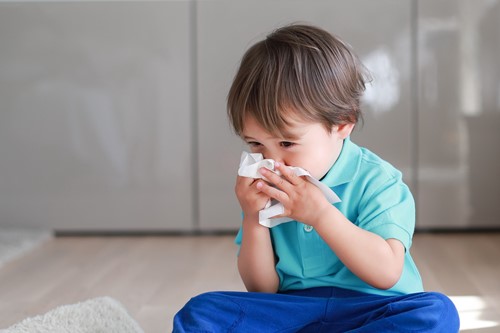Bugs Be Gone!
How to support your child’s immune health this winter.

Does it feel like a winter bug wonderland in your house? With more time inside and lots of mingling without fresh air, it’s not a surprise that our children seem to be always catching something new.
Some parents worry that constant sniffles are a symptom of a weak immune system but it’s actually completely normal for a child to have 8-12 colds a year. Yep, that’s one a month! They are actually bugs with benefits – helping your child develop a robust immune system.
But if you’re thinking, “Thanks but no thanks!” or your child seems to be getting more bugs than this, or not recovering fully before coming down with another bug, it might be time to think about giving their immune system a helping hand.
Here are some simple tips to support your little one this winter:
* Ensure they get plenty of fresh air and movement. The lymphatic system is a really important part of your child’s immune system. It’s a network of vessels throughout the body that contains lymph that carries defence cells to where they are needed. Lymph relies on movement and muscular activity to circulate.
* Aim to cook from scratch whenever possible. Focus on whole foods that have not been processed and typically have a single ingredient. To save time, try batch cooking or doubling-up on recipes to cook once, eat twice (or more). Avoid processed foods and foods high in sugar as these weaken the immune system and reduce the body’s ability to fight off viruses and other infections.
* Eat the rainbow every day! Fruit, vegetables, herbs and spices contain thousands of molecules called phytonutrients. These give plant foods their amazing range of colour and smell. Phytonutrients provide powerful protective benefits, support the immune system and add lots of flavour. Try to include as many different colours to get the broadest range of these fabulous molecules. Frozen is just as good as fresh, so even when the skies are grey your child’s food can be full of colour.
* Vitamin D is super important for the immune system. We can make vitamin D in our skin from sunlight, but from October to March it’s a good idea to give a vitamin D supplement. Infants 0-1 years should have 400iu daily (up it to 1500 iu when poorly) and children 1-12 can have 600-1000iu daily (up to 2500iu when poorly). Vitamin D rich foods include wild caught oily fish. Think SMASH (sardines, mackerel, anchovies, salmon and herring), red meat, egg yolks and liver.
* We all know it - vitamin C is an immune system super supporter! Include citrus fruits, kiwis, strawberries and pineapple. Raw cacao is also high in vitamin c and can be added to porridge or pop into a smoothie.
* Include a wide variety of immune supporting, zinc-rich foods such as meat, pulses, dairy, wholegrains, nuts and seeds. Liver is also a great source of zinc and vitamin A but limit to once a week as it is so high in these nutrients.
* Ensuring your child gets enough sleep supports their immune system. During sleep, our immune system gets to work fighting infection and inflammation. When we skip sleep, we can miss out on these night-time bug fighters and that means we are less able to ward off illness. So, what is enough sleep? This varies from child to child, but as a general guide, children 0-1 years old need at least 13.5 hours; 1-2 years old, at least 12.5 hours; 2-4 years old, at least 11.5 hours. Don’t get too hung up on numbers. Be guided by your child’s general mood and if they are generally happy, they are likely well-rested.
Zoë Gilbey MSc MBANT RCNHC is a Registered Nutritional Therapy Practitioner and mum of four teenagers, specialising in women’s and children’s health and wellbeing. www.zoegilbey.com
